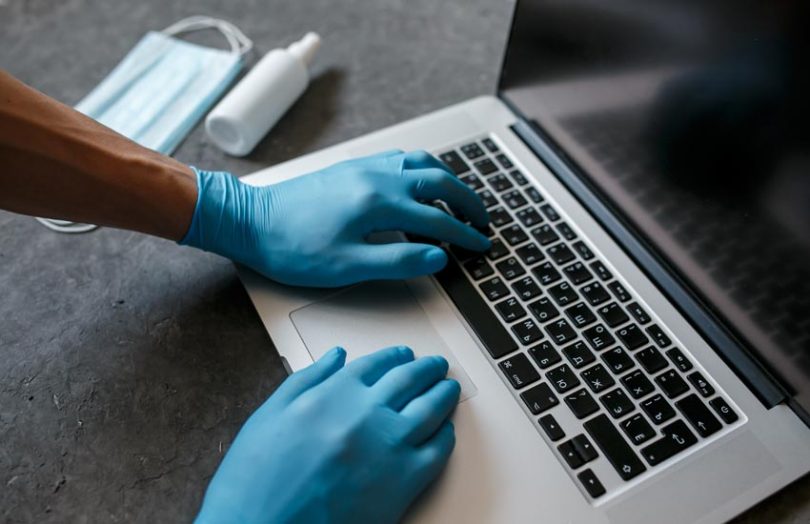We asked six blockchain firms that target enterprises how the Covid-19 crisis is impacting their companies. We’re conscious of the need to paint a rosy picture to the press, but on the whole, they were neutral to positive in outlook.
Part of the reason is many enterprise projects target either digitization or cost cutting, both of which are in demand right now. McKinsey recently wrote: “We believe the COVID-19 crisis is likely to significantly accelerate the shift to digital and fundamentally shake up the business landscape.”
Another difference for enterprise blockchain compared to other startups is the funding is often a strategic investment rather than venture capital. However, it might take a few months to see whether that’s an advantage or not.
And the situation will vary significantly from sector to sector. We spoke to firms in identity (Evernym), health (Mediledger), finance (Fnality, we.trade, Monetago) and advertising (Aqilliz).
Yet another factor to consider is stage of development. Most of the companies we canvassed are either in production or reasonably close to it. It will be easier for investors to abandon earlier stage projects.
The optimistic feedback we heard is in stark contrast to what’s happening elsewhere. For example, the Swiss Blockchain Federation is concerned that Crypto Valley faces an existential threat as a result of the Corona Crisis. It’s recent Crypto Valley survey found almost 80% of startups said they will likely go bankrupt within six months. 57% had already dismissed some employees. And last week we reported that New York based ConsenSys had laid off staff, the second time since February.
Only time will tell how it pans out for the enterprise blockchain sector. Here’s what the six firms had to say.
Evernym – identity
Evernym, one of the leading companies in the self-sovereign identity sector, has seen a mixed bag. The company acknowledged that some early pipeline projects dried up during the panic period.
“For many enterprises, innovation is seen as a discretionary cost, and one of the first budgets to be cut in trying times,” commented Evernym Director of Marketing, Alex Andrade-Walz.
But if ever there was a time for privacy-preserving identity and credentials, it is today. There’s a demand for remote access, touchless customer authentication and emergency crisis response measures.
Andrade-Walz pointed to “the need for a digital trust architecture, and we’re seeing a surge of interest from governments, hospitals, universities, and enterprises that have come to the same realization and are moving to rapid adoption of portable credentials.”
The company is a member of the 60-strong COVID Credentials Initiative tackling immunity passports and more.
Mediledger – pharmaceutical supply chain
It’s been almost a month since we spoke to Susanne Somerville, Mediledger’s founder and CEO at Chronicled. She said they haven’t yet seen any COVID-19 impact on their business, apart from a few absentees (pharma execs) on conference calls who were busy fighting fires.
Mediledger has a solution in production that verifies pharmaceutical returns to ensure that any drugs re-sold by the wholesaler are not counterfeit. And it has a new offering that deals with contracts and chargebacks where the manufacturer pays the distributor.
Somerville is optimistic about the reactions she’s seeing as the company rolls out its second solution. “Time will tell, but ironically, I feel like we’re at an interesting tipping point,” said Somerville. “I feel more and more, that people look at our slides and they’re like: ‘Yeah, that’s the future'”.
She agrees that some companies could hunker down and ditch digital transformation initiatives as non essential. But they could also become protected projects. Somerville says there’s another approach: “Forget the digital transformation. Almost forget there’s even blockchain in there. Here’s a solution that can save you a lot of money.”
The pharmaceutical industry has published research that shows 1-4% of revenue is leaked in the pharmaceutical revenue management process. “We’re not tackling all of it, but I think there’s real savings because it literally makes the process happen accurately,” said Somerville.
Fnality – digital currency for inter bank payments
Fnality is the company behind the Utility Settlement Coin (USC) initiative, which is backed by numerous global banks, including UBS, BNY Mellon, MUFG and Santander. Last June, it raised £50 million ($61.7m) to implement a new on-chain payment system backed by money deposited at a central bank. It positions itself as enabling payments on-chain for wholesale banking, which in turn enables tokenization and pooling of liquidity.
The company isn’t seeing any major Coronavirus changes other than that commercial bank partners are temporarily distracted with pressing needs.
“The general perception we have is that banks are as committed as ever to things around digital and tokenization,” said Fnality Chief Commercial Officer, Olaf Ransome. “Those things that they’re trying to do around tokenization are somewhat long term strategic plays that reduce costs ultimately. So I don’t think this will have a massive impact, more of a speed bump kind.”
Monetago – trade finance fraud prevention
Turning to trade finance, we were curious about Monetago, because the U.S. startup has targeted clients in emerging markets, which involves some travel. Its initial solution, endorsed by SWIFT India, was an anti-fraud blockchain which logs all invoices financed by several Indian trade finance networks and banks. In doing so, it prevents a company from trying to finance the same invoice more than once at different banks.
Our question about whether travel might impact the firm was answered by finding that Monetago CEO Jesse Chenard decided to remain in Thailand rather than go back to New York. Chenard spent time in Asia during the initial Chinese Coronavirus outbreak and saw a more rapid response compared to the U.S. Hence his view is that intra Asia travel is likely to open up more quickly. And that U.S. and European travel may be impacted for several months.
Given he’s working on projects in Asia, he chose to stay. While webinars are great, they’re not the same as meeting in person. “I think there’s a lot to be said for interpreting the nuances of the conversation, being able to bridge the language barrier with a smile or gestures,” said Chenard. “It goes back to why we do business travel a lot. It’s because you’re building personal relationships.”
Chenard anticipates new hygiene-related precautions for travel. “But I do believe that we are going to all get back on aeroplanes as soon as this is over, probably in graduated stages. But face to face is still, I find, the most effective way to get business done,” said Chenard.
We.trade – trade finance
At times like these SMEs that are still able to trade need access to cash. This is the market that we.trade is initially targeting with open account trade finance. The network is backed by a dozen major banks, including HSBC, Santander and Societe Generale. While the trade finance blockchain has been live for some time, it’s still operating under “exception”. That means the majority of banks can only onboard up to 50 clients until they get security and compliance clearance, which should happen by June.
There are few sectors where the need for digitization is more pressing. Currently, most trade finance is still manual, so bankers need to be in the office to be able to access invoices and other documents. “People working from home don’t have the same access to documentation, and physically getting documents signed is a big issue,” said Ciaran McGowan, we.trade General Manager.
He referred to the International Chamber of Commerce, which has urged governments to remove any legal impediments to digital signatures and digitization during the COVID-19 crisis. Referring to the digitization push, McGowan said: “I think it’s going to be – in time – very positive for platforms like we trade.”
In terms of funding, we.trade raised the latest €7 million ($7.6m) from the shareholder banks this past September. It’s expecting another top up from existing shareholders to take it through to September when it will be opening up to external funders. McGowan emphasized that these are strategic investors, not venture capital firms and anticipates raising a total of €15 million ($16.2m) this year.
Aqilliz – Advertising / marketing technology
Compared to the other firms we canvassed, at six months old, Aqilliz is at an earlier stage of development. But it has an efficiency focus, aiming to enable advertisers to maximize their return on investment by tackling the lack of efficiency and transparency in the digital ad space.
While it uses the public Zilliqa blockchain (its sister firm), we included the startup because it targets enterprises and last year ran a test ad campaign with PepsiCo.
We assumed the firm will be hard hit, because a recession is likely to see big cuts in ad budgets.
Prateek Dayal, Aqilliz Chief Strategy Officer, acknowledged there is likely to be some impact, but we don’t yet know how big. “When it comes down to adtech and martech, which is the space we’re playing in, we believe there is going to be an orientation towards how you’re spending that martech budget. And there’s going to be a shift in favor of those platforms that help the advertiser get more bang for their buck.”
He also noted that because people are staying at home, budgets are being reallocated away from traditional ads towards connected TV and digital.
As an early stage startup, we thought funding could be an issue. But without being drawn on specifics, Dayal claimed Aqilliz is in a good position. Its initial funding came from Zilliqa, Singapore government funded Tribe Accelerator and others.
He also commented that the firm had sufficient runway to develop current projects, and will look to raise funds for the purpose of scaling up off the back of current projects with some big name partners.
To conclude, Monetago’s Jesse Chenard had been taking his temperature daily as he traveled around Asia. He quipped that giving the virus to a potential business partner is “kind of a deal killer.” Stay safe!






